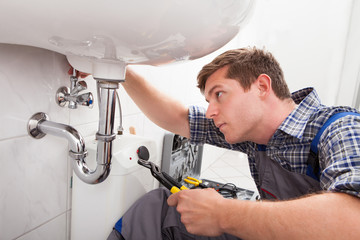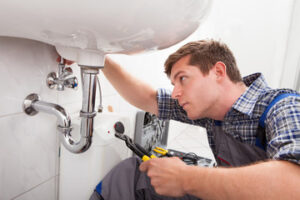Plumbing is the system of pipes and fixtures that distribute water, remove waste, and provide a range of services for a building. It’s a critical part of any home, and you should never ignore problems like clogged drains or leaking pipes. Plumbing can help keep your plumbing in top condition.
 The water supply is a critical component of your home’s plumbing system. It brings freshwater in and takes wastewater out. Your water line in a typical home starts at a public main and ends in your meter. The meter then sends water to your faucets and toilets.
The water supply is a critical component of your home’s plumbing system. It brings freshwater in and takes wastewater out. Your water line in a typical home starts at a public main and ends in your meter. The meter then sends water to your faucets and toilets.
Water pipes come in a variety of sizes and materials, including plastics, copper, galvanized iron, and steel. The type of piping you use in your home depends on your needs, which is why it’s important to know what’s available.
Your house’s water supply line leads to the main water heater, where it splits into two pipe paths: one for hot water and another for cold water. The hot water path is called the service line, and the cold water path is called the lateral or secondary line. In some houses, both of these lines are directed to different rooms. This is an efficient way to provide the most convenient access to hot and cold water.
The water disposal is one of the most important components of any a home or business. There are a multitude of waste disposal technologies on the market to choose from, so it’s vital that you have the right solution for your needs and budget. The good news is that the right solution will keep your family and business safe from germs while saving you money in the long run.
The most effective solution is a combination of the latest technology, expert installation and routine maintenance. In the long term, your best bet is to partner with a company that has been rated for the highest level of expertise in their field. To be able to trust that company with your plumbing and waste management needs is the best way to go about ensuring that your home or business continues to function at its optimum levels. Contact us today to learn more about how you can achieve this with the help of one of our qualified experts.
Every plumbing fixture in your home needs ventilation to keep waste from clogging up drain pipes. This is done by removing gases and fumes that get trapped in the drain lines and allowing air to enter these pipes.
A vent pipe also helps protect trap seals that are used to prevent sewer gas from entering the home. The water rushing through drains creates negative pressure, which can cause trap seals to break down, leaving the trap only half full of waste and potentially releasing hazardous sewer gas into the house.
There are several options for plumbing ventilation, including true vents, re-vent pipes, and studor valves. All of these are important for keeping your system working properly and safely.
A heating system is a complex set of pipes and devices that circulate water in an effort to warm up your home or office. Depending on the size of your abode, your heating system may consist of a boiler, furnace, or an array of electric heat pumps. Modern homes and offices are outfitted with sophisticated controls and monitoring systems to keep everything on the right track. One of the more esoteric tasks is selecting which heating device is right for you. Traditionally, most homes and offices have a central boiler to heat the main building, with smaller boilers for individual rooms. A well-designed central heating system will save you money in the long run.
Various energy sources, including gas, electricity, oil, and coal can power a heating system. The best heating system for your budget and your lifestyle will entail a careful cost-benefit analysis. The best way to do this is to hire an expert in the field to evaluate your needs and design specifications fully, then perform a detailed cost-benefit comparison between the various options before making your final selection.



 There are a number of benefits to becoming a plumber. First of all, there is a high demand for qualified plumbers. Despite their high pay, plumbers risk contracting infections. Infections and other diseases can be transmitted through fecal matter or vomit. Furthermore, the sewage system is often contaminated, and it can cause plumbing issues. Hence, it is important to have the necessary training and certification.
There are a number of benefits to becoming a plumber. First of all, there is a high demand for qualified plumbers. Despite their high pay, plumbers risk contracting infections. Infections and other diseases can be transmitted through fecal matter or vomit. Furthermore, the sewage system is often contaminated, and it can cause plumbing issues. Hence, it is important to have the necessary training and certification.